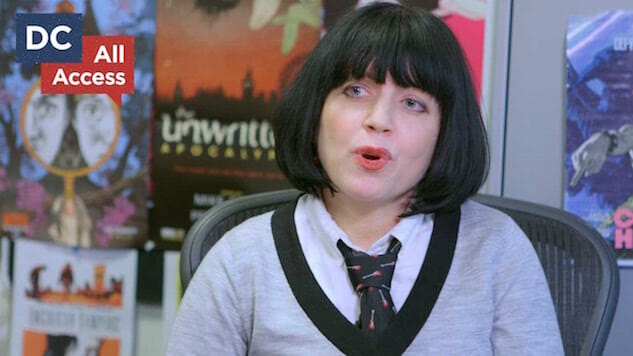It’s been quite the month for DC Entertainment. Announcing that they would be restructuring their Vertigo imprint—the home to such iconic, mature-readers game changers as The Sandman and Preacher—DC also revealed the dismissal of longtime Vertigo editor, Shelly Bond. Bond, who began as an assistant editor in the imprint’s first year, has been with the company for over two decades. In that time, she has, in one capacity or another, worked on some of the imprint’s most important series, including the aforementioned Sandman, Grant Morrison’s The Invisibles and Bill Willingham and Mark Buckingham’s Fables. The announcement comes as quite a shock, though, and it’s unclear what insights inspired the management at DC to instigate her departure. It also coincides with the news that My Chemical Romance frontman, comic writer and former Vertigo intern Gerard Way will be launching a new publishing line called Young Animals, which revisits Vertigo series including Doom Patrol and Shade. Young Animals’ creation was speculated as the cause for Bond’s lay off, but Wonder Woman: Earth One colorist Nathan Fairbairn tweeted that Bond was, at least at one point, intended to edit the new imprint. While it remains to be seen whether or not that is true, it is worth noting how much of a surprise this was—even to those supposedly in the know.
Bond’s departure mirrored the 2013 restructuring of Vertigo, which saw the (voluntary) exit of Vertigo founder Karen Berger, and it immediately began raising questions about DC Entertainment’ hiring and firing practices, following previous discussions about harassment in the comic book industry. Outlets like Bleeding Cool and The Beat disclosed “the open secret” that Alex de Campi referred to in a blog post from September of last year:
“Now, the Superman office allegedly employs no women, and a cursory glance over the mastheads of several Superman titles and Wonder Woman seems to confirm that allegation. The reason, I’ve been told by several people who work or used to work at DC, is because one of the most senior editors is a sexual harasser with multiple incidents on his HR file.”
Anyone with a copy of a Superman comic book could have looked at the indicia and known who de Campi was referring to, but after news of Bond’s departure broke, Eddie Berganza was explicitly and publicly named. The reaction this provoked on Twitter even saw Berganza’s name briefly trend for some people, though DC Entertainment has yet to make a response.
But while Vertigo editor Jamie S. Rich assured everyone that the line was alive and well, Bond was no longer the story. Berganza was the story, and it was difficult to deny the optics. It’s not unimaginable that DC Entertainment had legitimate reasons for dissolving their relationship with Bond—it’s impossible to tell, and Bond herself may have even wanted to end the relationship. We simply don’t know. What’s less opaque, however, is the comic book industry’s history of harassment, of obfuscating that harassment and of fostering an environment that is, by all accounts, actively hostile to women.
Bond was an industry veteran, and she had proven herself over the course of 20 years. The only person who had been with the vaunted Vertigo imprint for longer (and 30 years total at DC) left the company just a few years prior. Bond’s name has appeared in the credits of the imprint’s highest-profile and longest-running books. What’s more, Bond leaving means that two of the women most important to mainstream comics have fled the community in just three years. Meanwhile Eddie Berganza remains employed. And to deny that this situation presents powerful urgency for something to be done is to deny the experiences of people like former DC editor Janelle Asselin. Not limited to Berganza, however, now others are alleging inappropriate behavior by other members of DC Entertainment staff.
Looking at the facts on hand, it’s impossible to draw any direct correlation between the two, insomuch as one neither caused, was caused by nor precipitated the other. But Shelly Bond leaving DC Entertainment is a rare case of legitimate comic book industry news—not the unveiling of a new costume or preview pages from a new event series. This change, for whatever reason, is the one that caused some to start naming a name that many claim to have known for a very long time, and now the two are inextricably linked. Shelly Bond wasn’t fired so that Eddie Berganza could keep his job; Shelly Bond was fired even though Eddie Berganza gets to keep his job.
Under this lens, the story of Shelly Bond and why her relationship with DC Entertainment is being terminated is irrelevant. Whether or not Vertigo survives in her absence is irrelevant, regardless of whether or not you believe the imprint’s best days are long behind it. In this way, the story of Shelly Bond is inextricable with the story of Eddie Berganza, just as the story of every woman denied an opportunity is tied to the story of every man given a second, fourth, sixth chance.
What then does this particular moment say about the comics industry, or the comics community? Nothing good.
